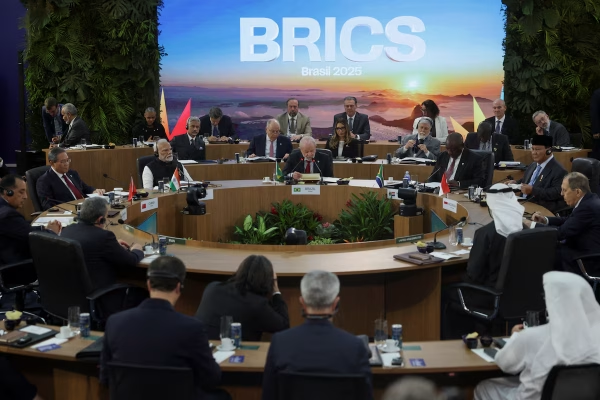
On 6–7 July 2025, BRICS leaders met in Rio de Janeiro under the theme “Strengthening Global South Cooperation for a More Inclusive and Sustainable Governance.”
This summit marked an important milestone in amplifying the role and voice of the Global South on the international stage and in promoting a more equitable global order.
The final Declaration reflects this ambition through several key developments. The inclusion of Indonesia as a new member, alongside the admission of additional partner countries, demonstrates the group’s commitment to becoming more representative of current geopolitical realities. The summit also introduced significant new initiatives on climate finance, global AI governance and public health, highlighting concrete steps to support sustainable and inclusive development. Leaders reaffirmed the importance of renewed multilateralism and South–South cooperation as essential levers to address global challenges, reduce inequalities and build a fairer and more united future.
One passage is particularly relevant for the ILO. In paragraph 114, the Heads of State and Government explicitly acknowledged the work of the BRICS Labour Ministers’ Meeting. They stressed the need to promote quality employment and human-centered, inclusive labor markets, while recognizing that artificial intelligence is profoundly transforming labor relations. Although this transformation brings new employment opportunities, it also poses risks of job displacement and growing inequalities, particularly affecting women, youth, older workers and persons with disabilities.
Social dialogue was highlighted as essential for addressing climate change and ensuring a just transition across all sectors, including the informal economy. Supporting youth employment emerged as a shared priority, with calls for structured public policies, smoother school-to-work transitions and new youth-led initiatives. Women’s economic empowerment was equally emphasized, with leaders underscoring the need to tackle structural barriers, promote financial and digital literacy, and extend social protection, especially within the digital and informal economy.
In response to these challenges, the leaders committed to developing inclusive and responsible policies to ensure that technology benefits everyone. They stressed the importance of strengthening social protection, safeguarding workers’ rights, fostering social dialogue, and investing in lifelong learning to build digital skills. They also emphasized that digital and green transitions must remain centered on people and help create decent work, including in the informal economy.
The Declaration further commended progress in urban resilience and affordable housing, while underscoring the importance of localizing the SDGs and advancing urban inclusion. Efforts to foster socially inclusive business and trade, notably through digital skills and food security initiatives, were welcomed. Disaster risk reduction was recognized as an urgent need for the Global South, with a focus on early warning systems, resilient infrastructure, and equity-driven approaches.
These recognitions underscore the relevance of the ILO’s mandate in promoting and supporting truly people-centered South–South and triangular cooperation. They also show how essential it is to ensure that innovation and technological progress become real drivers of inclusion and sustainable development for all.

